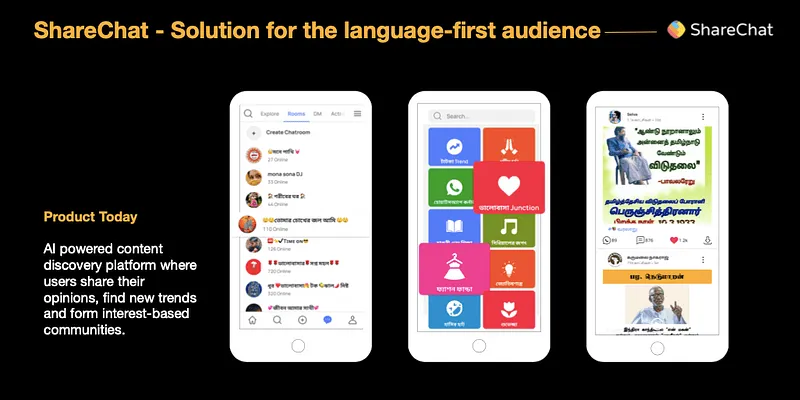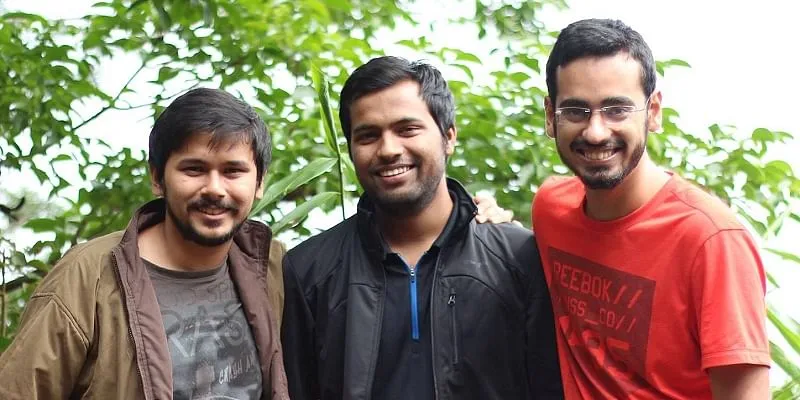Challenges of serving a billion-strong user base are not trivial, says Farid Ahsan of ShareChat
ShareChat’s focus currently, in preparation for this scale up, is to hire great tech talent and compete with the market leaders like Google and Facebook in hiring and investing in their upskilling, said Farid Ahsan, COO and Co-founder of ShareChat, at TechSparks 2021.
Being an entrepreneur requires an extraordinary amount of self-belief, sometimes to the extent that even your close friends and family tend to believe that you are incredulous. And that sort of self-belief is in abundance within Farid Ahsan, the COO and Co-Founder of , who spoke to YourStory’s Shradha Sharma at TechSparks 2021, India's most influential startup-tech conference hosted by YourStory.
Farid talked about the story of ShareChat so far, and the prospects ahead for the social commerce unicorn. In an indication of their ambition, Farid and his co-founders firmly believe that the next big thing in social media, even at a global scale, is likely to come from India and they are working to make that revolution happen today.
The ShareChat founders believe that when it comes to unleashing creativity in this country and monetising the short-video space in Bharat, all the startups are merely scratching the surface.
Talking about creating the largest indigenous social media and short-video platform, Farid acknowledged the importance of both luck and tenacity. He believes that the last year, especially post-pandemic, has been a culmination of all the blood, sweat, tears and hard work that has been put behind creating ShareChat.
The growth boosters
That said, Farid believes that ShareChat as a project has been extremely lucky for having been in the right place at the right time. They have benefitted from the 4G revolution in India, which led to the massive penetration of high-speed internet and data into their core user-base of Indians living in small towns and villages.
The advent of affordable smartphones has made it possible to extend the reach of creator economies, even to artists and talented people in the farthest corners of our country and a reverse brain drain that they have seen, due to multiple factors but mainly rising bar for immigration in foreign countries, has enabled them to hire and engage world-class talent. “All these have made it possible for ShareChat to scale faster,” Farid said.
Another enabler for the startups ecosystem has been the availability of capital. Regulations have dramatically changed to favor foreign direct investments through the venture capital (VC) route across the board, and VCs have shown their confidence in the Indian startup ecosystem after the initial successes in the early 2010s.
“As India has matured as a startup ecosystem, there has been a cross-pollination of talent – founders have turned mentors, there are many clubs and communities to help first time founders bounce-off ideas,” said Farid. “This has helped founders become more ready when they start-up,” he added.
The importance of competition
Acknowledging the importance of competition, he singled out TikTok for having established the short-video market in India and for having made investors and even local players commit harder towards its potential. Indeed, with they have secured the same users left behind after the departure of Tik Tok – something where the luck factor has once again played a positive role. “Over the years, even the larger platforms like YouTube and Instagram have realised that there is a viable demand for short videos in India,” Farid added.
Farid added that ShareChat has remained a leader in this space due to its early adoption of this format and they want to be ready for the time when the country has a billion internet users connected via smartphones, to consume and share their content.
The billion-users’ challenge
“However, the challenges of serving a billion-strong user base are not trivial,” said Farid. Highlighting some of the key deliverables that the ShareChat team is aggressively working on, Farid talked about the importance of getting the technological infrastructure right.
Their focus currently, in preparation to this scale up is to hire great tech talent, compete with the market leaders (Google and Facebook) in hiring business talent, investing in their upskilling and exposing the young engineers in the company to bleeding edge technology through their ShareChat labs initiative.
“The idea is to build an unparalleled AI/ML stack for video content at scale, focused on Indian users, based on their current user base and knowledge of Indian markets,” Farid added.
Delving further into the resources needed to meet this challenge, Farid mentioned that capital availability in the early stages is vital to build this infrastructure upfront. This is because, even in the next 3-5 years, they are looking at 800 million Daily Average Users (DAU), which comes out to be 10% of the world population.
“For an Indian company like ShareChat, availability of venture capital becomes even more essential as it is competing with tech giants like Google and Facebook who have an ample cash chest to fund their strategic projects and to even pick up ideas from Indian models and scale them fast,” he said.
Speaking with experience of being a unicorn co-founder, Farid noted that luckily the investors are getting their logic in the recent months, understanding that yields are very attractive on such investments if their portfolio companies emerge as market leaders. “They are looking at raising capital in a short order to help them cross the finish line for building the first short video content platform for a billion strong Indian users,” he said.

Current product, ShareChat
The Indic advantage
Responding to the criticism around the low ROI on Bharat, Farid countered it by saying that we are just seeing the starting phase of India’s social media revolution, especially in Indic regions (where the predominant language of communication is not English). “Even within ad-space in India, majority of spend goes into print and electronic media, whose targeting is sub-par compared to digital channels,” said Farid.
If Facebook and Google can capture 80-90 percent of global ad-spend, there is a scope for an Indian social-media start-up to do the same for an under-penetrated market with a diversity of consumer tastes and languages which hasn’t been solved for,” he added.
The opportunities for Bharat are not just limited to ad-spend, believes Farid. “At a scale of 800 million to a billion users, even if you make $3-$4 in average revenue per user, which could be possible by the middle of this decade, the potential revenues run in billions,” said Farid.
ALSO READ

Beyond short-videos
Aside from ad-spend, the Mohalla Tech founders are also keenly looking at micro payments, beginning with their platform Moj. Specifically, the spend on virtual gifting through chat rooms is picking up quite fast. “In a way, these trends are not very different from what we are seeing even in offline markets,” Farid said.
Farid also shared his perspectives around ShareChat Labs - a new SBU based in the US - that they started for tech talent willing to contribute back to India. Being in the US recently, the founders felt a great urge to bank on their experiences and tap them as senior engineering resources.
Farid explained that the purpose of ShareChat labs is two-fold – the first is to groom and mentor the entry level engineering talent in India and make it possible for them to broaden their horizons by exposing them to best-of-class approaches in product design and innovation.
The other goal is to collaborate with engineers who have had significant experience building products for Silicon Valley to add their technological nous to push ShareChat efforts in AI/ML at becoming better at sharing and suggesting content and moderating activity on its platform.
The paradigm shift
Commenting on ShareChat’s widely reported culture of being firm with VC investors when negotiating with them, Farid said that there has been a slight paradigm shift as the ecosystem has matured. “Today, with 34 new unicorns this year within India’s startup ecosystem, even the investors realise that this success hasn’t been a fluke as some of these startups have been working on their ideas for over a decade, if not more,” said Farid.
“Where we are is a leapfrog moment for India’s startup ecosystem and that acknowledgement is seeping into practices of VCs as well,” he added. “As for them, most of their VCs have respected their choices and reiterated that “Founder is the King” when it comes to making strategic decisions within the company.”
Learnings from the journey
Reflecting on his own evolution as an entrepreneur, Farid talked about his maturation as a person alongside ShareChat.
Farid said that one of the key lessons he has learnt, which he shares regularly with young founders, is that one cannot do everything as an entrepreneur, but at the same time one must initiate things. “The next step is to learn to let it go, find an expert and leave it to them,” he added.
As an early entrepreneur, he found it hard not to fall in love with every product or feature he introduced. The maturity comes in understanding why every great thing will not be carried through – some ideas one must let go of and some others one needs to find someone else within the company to adopt.
Another aspect that Farid emphasised on, while talking about his journey as a founder is the importance of compartmentalising the personal and professional sides of one’s life. Initially, most people in an early-stage founder’s startup are roped in from a community of friends and acquaintances.
And in the early phases, when you are building your first Proof of Concept (PoC), there is hardly any distinction between your personal and professional space. However, the direction that your journey takes a company will often demand that some people leave, and some are let go of.
“Having that equanimity to compartmentalise your personal equation with them and the requirements and realities of professional life is another important lesson entrepreneurs must learn to maintain a healthy work-life balance and nourish their social relationships,” Farid added.

Founders of ShareChat
Evolution of the organisation’s culture
Elaborating his vision on the evolution of culture at ShareChat, Farid said that initially, the culture was very undifferentiated when they started out – the usual Work Hard, Party Hard ethic that exists among a bunch of friend-cum-co-founders. “However, as your organisation grows larger, you cannot replicate this dynamic at scale,” he told.
At some point, the founders need to define what practices, beliefs and attitudes they value and what they do not, to set the right cultural context. “This has become even more important in today’s world where we are working through hybrid workplaces,” said Farid.
At ShareChat, the most important thing they want everyone to believe is that they are competing with the world’s top tech talent and that they should be proud of what they do.
That pride, in Farid’s view, should extend beyond numbers, to impact – to every content creator who relies on ShareChat and Moj to earn an audience, every person who relies on ShareChat to build an online persona to which they are deeply attached – the employees need to consider all such people as stakeholders.
“And this pride and responsibility towards their users should internally drive them to become quicker, iterative and be a constant learner,” Farid added.
Demystifying the Bharat user
Farid also helped to demystify the Bharat user, with whom he interacts daily. To ShareChat founders, over the years, the Bharat user is no longer different from the Indian user. “Earlier, the way such users searched the internet and explored content would be different, but as they have spent time over the web their behaviour has moved up the curve and converged with that of any other user in India’s larger cities,” Farid explained.
They too understand the pros and cons of social media platforms, the need for fact-checking and privacy, something which wasn’t the case for ShareChat in its early days in 2015. In that sense, this convergence is what the founders feel is a bigger theme in Indian society – they are seeing a bigger cultural convergence – emergence of indigenous and Indic artists (Rapper Emiway Banta to name one) who have an audience across the country.
While the Bharat user is slightly different than India user in the type of content that they consume, but is developing its own powerful sub-culture – chats are in Indic languages written in Roman script, there is a growing awareness and adaption of global pop culture icons and tailoring of local pop culture content in the same forms of expression for the global audience (Hindi Memes and gifs).
As a company at the forefront of running a content platform for Bharat, even the ShareChat founders are pleasantly surprised at the scale of activity and cultural dispersion that has organically emerged as a result of their efforts.
The way forward
The creator ecosystem is the engine that runs ShareChat, the development and monitoring of which is one of Farid's core responsibilities. Creators, as per him, tend to fall a bit behind in the public perception around short-video content platforms, but to ShareChat, they are the people that make possible both the content and the commerce around it.
As ShareChat scales to serve a billion users, they are investing and training content creators in tools that help them monetise their business, build a personal fan base and accept micropayments for their content.
In fact, the reality that they have been able to onboard and retain so many creators on their platform dispels another popular notion around India’s content consumption – Indian users are not willing to pay for content because piracy is rampant. “As ShareChat aggregates demand on scale and integrates it with the UPI stack, an affordable and accessible creator economy is emerging, provided the pricing is correct,”said Farid.
“The idea is to further democratise transactions and make content creation even more accessible,” Farid said.
Farid concluded by talking about his co-founder, Ankush Sachdeva, who he considers a role model because of his ability to remain tenacious and curious despite the steep challenges that building an Indian social media giant involves. And the feeling of breaking barriers daily, of every day being exciting and non-repetitive and full of personal learnings, that makes him stay on his mission.
To log in to our virtual events platform and experience TechSparks 2021 with thousands of other startup-tech enthusiasts from around the world, join here. Don't forget to tag #TechSparks2021 when you share your experience, learnings and favourite moments from TechSparks 2021.
For a line-up of all the action-packed sessions at YourStory's flagship startup-tech conference, check out TechSparks 2021 website.

Edited by Rajiv Bhuva










![[Funding Alert] Zorro raises $3.2M from Paytm's Vijay Shekar Sharma, Zilingo's Ankiti Bose, and others](https://images.yourstory.com/cs/2/a9efa9c02dd911e9adc52d913c55075e/Zorro-1639118039689.jpg?mode=crop&crop=faces&ar=1%3A1&format=auto&w=1920&q=75)